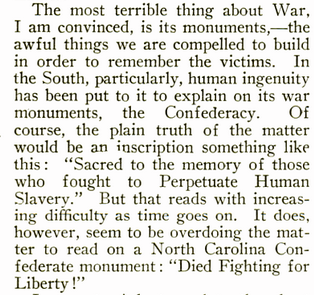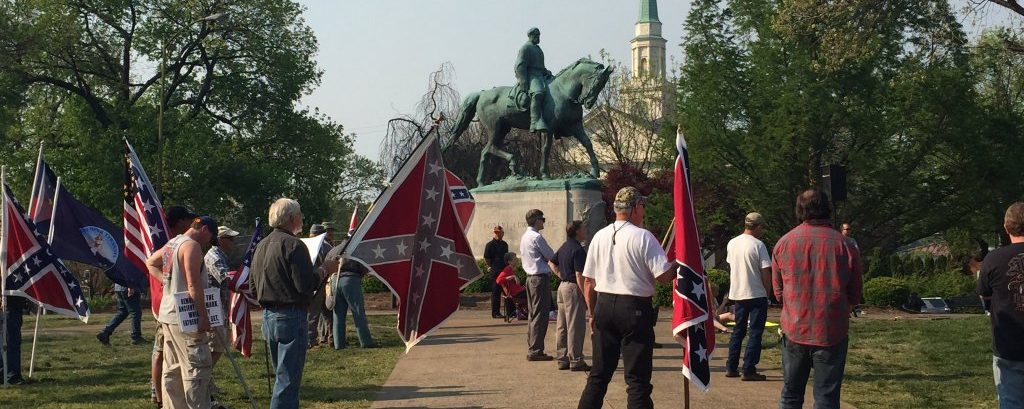Thanks to all of you who have offered suggestions on how to improve #NOLASyllabus. The list has expanded and deepened in a number of ways, though I am still trying to get a sense of where it is going. Please keep them coming.
Certainly the most exciting part are the references that I most likely would never have come across on my own. Consider the following reference to a 1931 issue of The Crisis in which W.E.B. DuBois offers some brief remarks about Confederate monuments while traveling through parts of the South.
 DuBois’s reflection on the selective memory and history of Confederate monuments comes right in the middle of a narrative on the challenges and contradictions of traveling through the South at the height of the Jim Crow era.
DuBois’s reflection on the selective memory and history of Confederate monuments comes right in the middle of a narrative on the challenges and contradictions of traveling through the South at the height of the Jim Crow era.
DuBois pushes right back against the myth of the Lost Cause. He refuses to draw a distinction between the Confederate government and the men in the ranks. DuBois clearly understood that as long as white southerners were able to mythologize the war through their monuments, African Americans would remain second class citizens.
Confederate monuments did not just occupy the Jim Crow landscape. For Dubois, they helped to make it possible.

The Southern men who truly had no stake in the slave system, such as the inhabitants of Appalachia (western Virginia and North Carolina, eastern Tennessee, northern Alabama and Georgia, did not join the Confederacy. They lived in areas with few or no enslaved people, had no hope of acquiring slaves, and thus had no incentive to fight for the right to extend slavery into the territories or to maintain rich planters property interest in owning enslaved people.
Thank you
“Died Fighting for Liberty!” Would DuBois’ words have as much impact if that monument was destroyed? I would rather see a plaque engraved with his words adjacent to this Confederate monument.
Interesting idea. Thanks.
Sadly interesting. Anyone with any common sense and understanding of war by being a participant in one know why soldiers fight and are so loyal to their comrades and officers.. I am a Vietnam Vet disabled, decorated and a history buff. In particular the Civil War or as the Confederacy called it, “The Second War for Independence”. Current bias and political correctness shades the truth an ugly gray. The South determined to form their own country as did the founders against an oppressive King. Slavery was an issue but not THE issue. On July 3rd 1863 15,000 Confederate soldiers, ill equipped, many shoeless and ragged formed a line almost a mile long. As soon as they marched out of the trees, long range rifled artillery rained down on them. As they marched the long mile up the hill short range cannister rounds tore holes through the lines. At 300 yards new rifled barrel rifles volleyed into their ranks. A few of the 15000 mage it to the Union lines. The Union army outnumbered them 2-1. As the y breached the stone wall the Union reserve charged them with bayonets killing or capturing the few who made it through that Hell.
Here’s my question to you and or your blog friends: Why? Why did all those men go up that hill knowing what was waiting for them? It was not their first battle. Why would those soldiers who never owned a slave, could never afford a slave, who worked 40 acres just to feed their families go up that hill knowing that half at best would live? Do you honestly believe those men did it so someone else could get rich with slaves?
Your thinking like most people are not capable to go to that level of thought. Do you think the men in the ranks contemplated slavery and had long discussions about the right or wrong of it? What about the Union soldiers do you really think they were on a crusade for humanity. By 1863 the draft had started in the north and immigrants coming in to NYC were inducted as they came down the gang plank. Many never saw their families again. Yeah sure, they would sit around the fire talking about what great men they were freeing the slaves. So much for high ideals and intellectual thought. I was an infantryman and we never talked about the right or wrong of what we were fighting for.
So go ahead and tear down statues and defame honorable men who believed in the Sovereignty of their State above the federal government. Lee was said to always say before a battle “God’s Will be done” I believe God’s will was done at Gettysburg. There would have been continuing fighting over the Western expansion. The Union had to be saved. The victors always write the history. One last thing. Lincoln’s assassination was the worst event for the South after the Surrender. Lincoln had a grandiose plan for restoration. What did happen was hate combined with revenge to the South.
I am afraid that Mr. Coonce has it exactly ‘ass-backward.’ The Confederate infantrymen engaged in that last charge were fighting to preserve every scintilla of their culture, including slavery. Although most, if not all, may not have owned any enslaved people, they all benefited from the system. Read your Adam Smith, wherein he lays out how all members of a particular economy, no matter their station, become contributors or beneficiaries of the system in question. This was true of these young men as well. So to drape their effort in some kind of innocence, is a sham.
To answer your question as to what motivated these young men, it was not only the covert economic lure, but was also the unit cohesion/camaraderie that every military organization is built upon. But interestingly, there was also another spur, and that was the racial message that these infantrymen were not Black Africans – they were members of the “Herrenvolk” bourgeoisie that valued their white skins more than any other asset. Read James McPherson for a fuller explanation.
Slavery was the ONLY issue that propelled the initiators of secession. EVERY Secession Declaration states that the object of the various states, who chose that path, did so to maintain that awful system. There was NO OTHER reason. To believe so, is to fall for one of the most vicious self-serving apologies the Neo-Confederacy churns out. It is unworthy of any person who values the truth.
I have had enough of these ‘useful idiots.’
Thank you for your insight. Mr. DuBois’ perspective—sadly, still relevant today……..
Excellent!
“Confederate monuments did not just occupy the Jim Crow landscape. For Dubois, they helped to make it possible.” Exactly! Those monuments have been a marble plague on the psyche of southerners–whites as well as blacks. The sooner they go, the sooner southerners can begin to recover.
Speaking of DuBois, In the marvelous, ‘This Vast Southern Empire’ by Karp, the activist targeted the entire ‘Strong Man’ Theory in a speech given in 1890. “I wish not to consider the life of the man (Jefferson Davis), but the type of civilization which his life represented:it’s foundation is the idea of the Strong Man – individualism coupled with the rule of might – and it is this idea that has made the logic of even modern history, the cool logic of The Club.” And he goes on from there. DuBois even mentions the use of the term ‘effete civilizations’ which was used beginning before the Civil War for Native Americans, the Phillippenes, Algeria, etc. Interesting that Bolshevism, Fascism, white Nationalists, The Christian Right, all decry liberal social democracies as ‘effete.’ But as Lincoln understood, a slight preference for the feminine in our social discourse and our social economics is actually democracy’s secret strength. We ‘wait for it,’ and as Mr. Trump is now realizing, we sink all the aggressors, even if the process is hard on the bystander’s nervous system. Does that all make sense?
I can’t recommend that book enough.
Thank you for the perspective(s) you bring to this issue…
Thanks for taking the time to comment. Glad to hear you find this site helpful.
DuBois was right!
Thanks for posting!